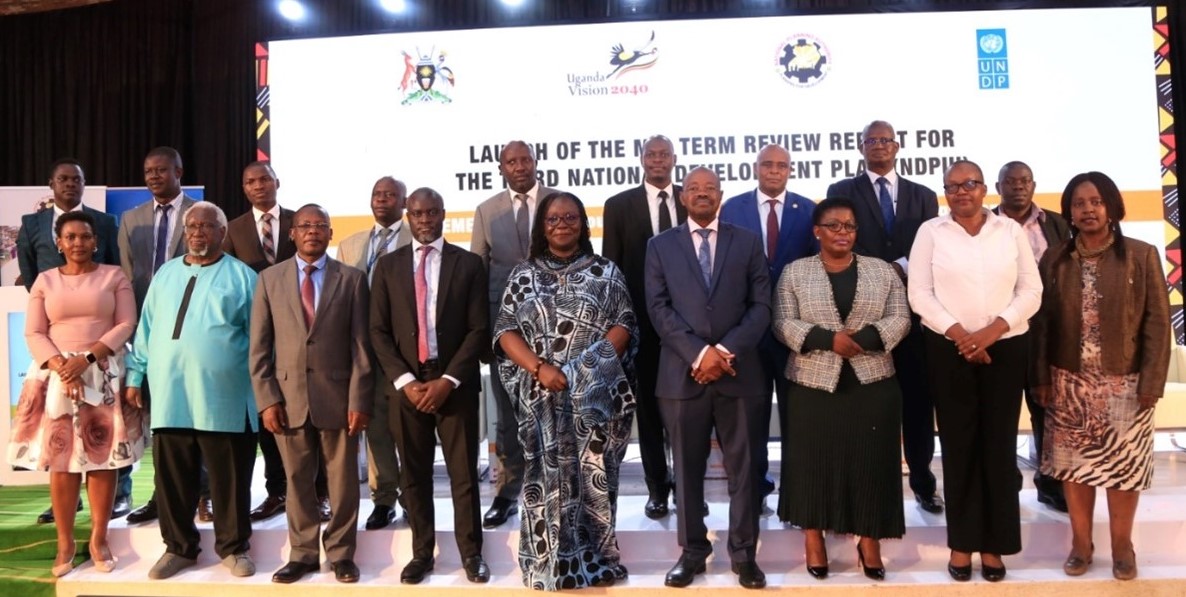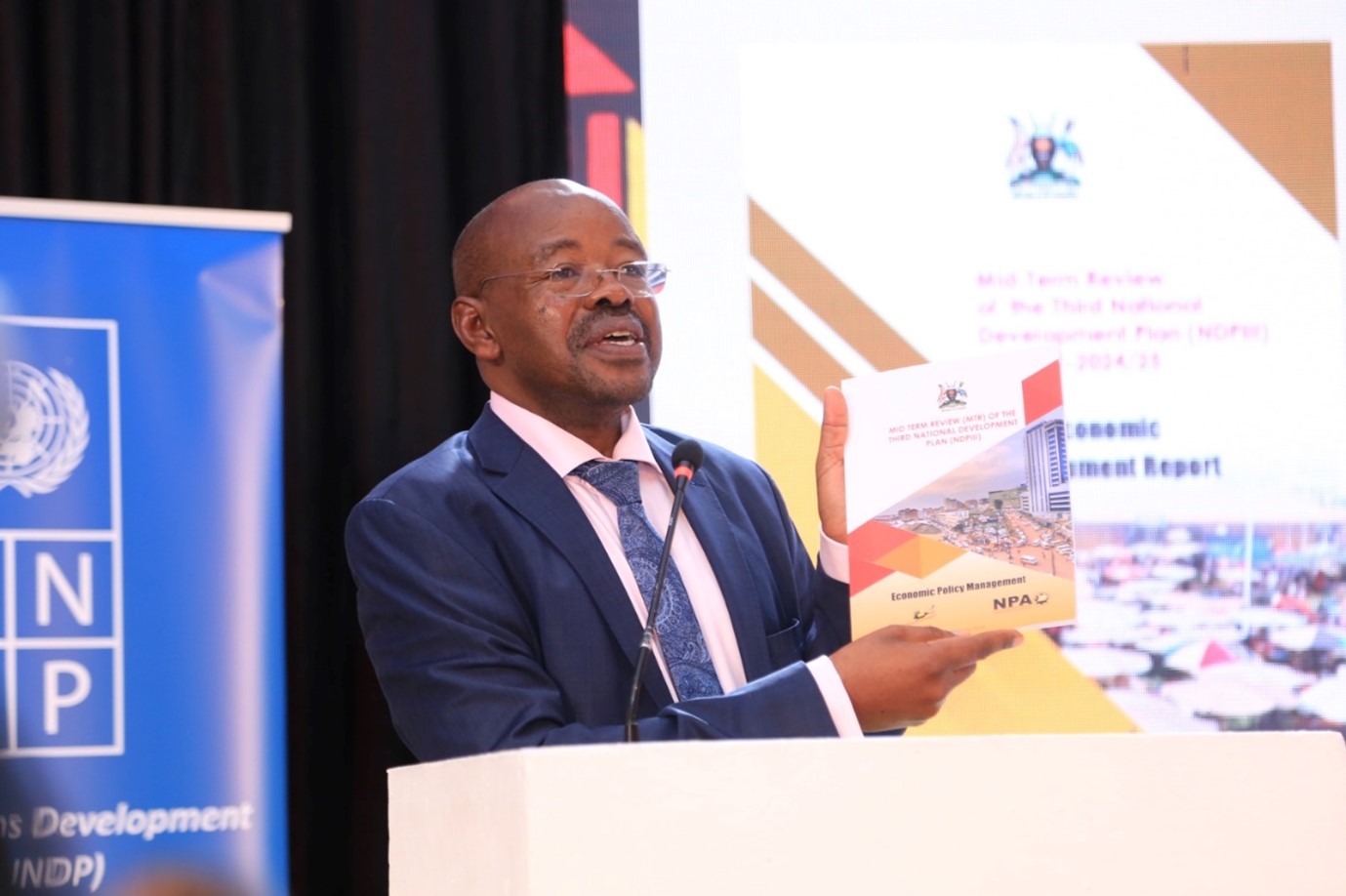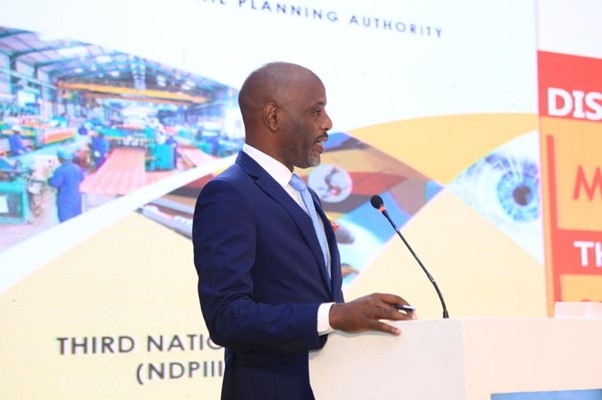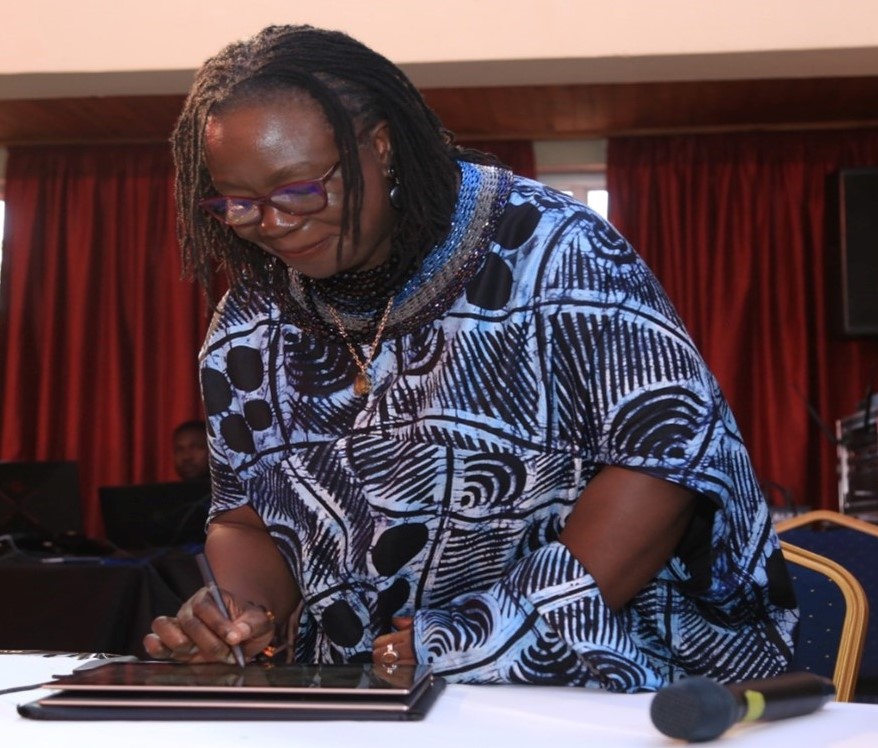Uganda Reflects on Performance of NDPIII as it Starts Preparing New Development Plan
May 15, 2023

Government and UNDP personnel and other stakeholders at the mid-term review workshop
Uganda needs to do more to achieve the aspirations of its third National Development Plan (NDPIII), a blueprint that embodies the country’s development ambitions for the period 2020-2025. This observation was made during the dissemination of the NDPIII Mid-Term Review (MTR) results convened by the Ministry of Finance, Planning and Economic Development (MoFPED) and the National Planning Authority (NPA) with technical and financial support from the United Nations Development Programme (UNDP).
The dissemination event was presided over by the Minister of State for Planning Hon. Amos Lugoloobi, and Minister for General Duties/Focal Minister for SDGs in the Office of the Prime Minister Hon. Justine Kasule Lumumba alongside other high-level dignitaries from Government, Development Partners and Civil Society Organizations.
During the meeting, government also presented the fourth National Development Plan (NDPIV FY2025/26 - FY2029/30) preparation roadmap, outlining processes and timelines for preparing the next five-year plan that will guide the nation’s development and transformation.
NDPIII Mid-Term Review Results
The mid-term review results show that the country attained only 17% of the targets set in the plan halfway into its implementation, “This weak performance is attributed to challenges of COVID-19 effects and the existence of data gaps, full transitioning to the programme approach, as well as weak planning and budgeting for core projects,” read highlights of the results.
The results also show a decline in economic growth from a target of 5.2 percent to an average of four percent in the first two years of the NDPIII, which impacted the overall performance of the economy.
To remedy this, the MTR advises the government to revise growth targets to an average of 5.2 percent during the last two years of NDPIII, from an average of 6-7 percent because, “This is in light of the current realities.” To help the economy to rebound, it also asks government to re-orient the budget and target financing and investments to productive sectors of the economy and ensure fiscal discipline.

Hon. Amos Lugoloobi during the dissemination workshop
The NDPIII was launched in 2020 with the overarching goal of enhancing household incomes and the quality of life of Ugandans.
The Minister of State for Planning Hon. Amos Lugoloobi described the NDPIII MTR exercise as a tool for learning from the achievements and failures. “The Mid-Term Review offers the opportunity to renew our commitment and collaboration to achieve our national vision and global goals. We cannot do this alone. We need the support and participation of all stakeholders: government, civil society, private sector, development partners, media, academia and, most importantly, our people,” he said.

Dr. Joseph Muvawala, Executive Director, NPA, making his presentation
While presenting the key findings of the NDPIII, Dr. Joseph Muvawala, the Executive Director of NPA, elaborated on the challenges that constrained effective implementation. He specifically singled out slow implementation of public investments, limited progress in value addition and the agriculture sector, and coordination challenges across government.

UNDP Resident Representative Ms. Elsie Attafuah signing the NDPIV roadmap.
Accelerating NDPIII implementation
Ms. Elsie Attafuah, the UNDP Resident Representative, called for a deeper reflection on the outlook of the remaining NDPIII period, as well as the imperative to accelerate progress on the Sustainable Development Goals (SDGs).
Ms. Attafuah highlighted five strategic areas that need to be prioritized to drive structural transformation in Uganda. These include tourism and industrialization to drive socioeconomic transformation, export earnings, job creation and poverty reduction. Others are strengthening intra-African trade to drive inclusive economic growth and poverty reduction through harnessing opportunities presented by The African Continental Free Trade Area and private sector development to foster job growth, creativity and financial inclusion, particularly for women and youth and an incentive system to support small and medium-sized enterprises (SMEs).
Lastly, Ms. Attafuah saw huge and vast prospects for Local Economic Development to support production, manufacturing and employment through the successful implementation of the Parish Development Model (PDM.)
Cognizant of the role of data in informing development interventions, assessing progress and ensuring that ‘no one is left behind’, Ms. Attafuah said, “I call for deliberate and robust investments in data and analysis. We still lack or have inadequate data and indicators to assess progress on various SDG targets.”
She added, “To support the government in collecting and analysing more data, recently the UN System has developed a new Joint Programme, which we hope to launch soon as UN’s integrated offer of support on data and analytics.”
At a time when development is being defunded, developing and implementing an integrated national finance system is critical for mobilizing resources to achieve SDGs. Government of Uganda, with technical and financial support from UNDP and other partners, developed Public Investment Financing Strategy.

 Locations
Locations